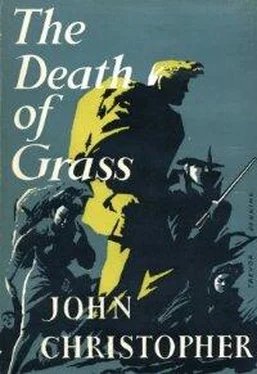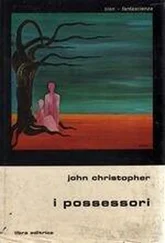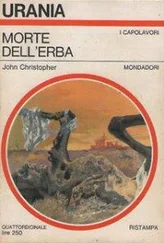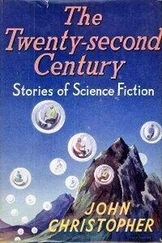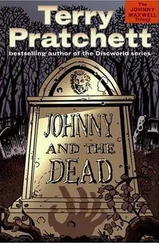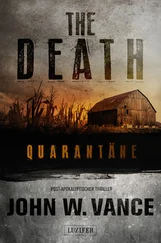“Napalm!” Ann said. “Oh, no.”
“What else? It’s that or evacuate, and there aren’t the ships to evacuate the whole of Hong Kong in time.”
David said: “But if they took Hong Kong—there can’t be enough food there to give them three square meals, and then they’re back where they started.”
“Three square meals? Not even one, I shouldn’t think. But what difference does that make? Those people are starving. When you’re in that condition, it’s the next mouthful that you’re willing to commit murder for.”
“And India?” David asked. “And Burma, and all the rest of Asia?”
“God knows. At least, they’ve got some warning. It was the Chinese government’s unwillingness to admit they were faced with a problem they couldn’t master that’s got them in the worst of this mess.”
Ann said: “How did they possibly imagine they could keep it a secret?”
John shrugged. “They had abolished famine by statute {18} 18 statute: law
—remember? And then, things looked easy at the beginning. They isolated the virus within a month of it hitting the rice-fields. They had it neatly labelled—the Chung-Li virus. All they had to do was to find a way of killing it which didn’t kill the plant. Alternatively, they could breed a virus-resistant strain. And finally, they had no reason to expect the virus would spread so fast.”
“But when the crop had failed so badly?”
“They’d built up stocks against famine—give them credit for that. They thought they could last out until the spring crops were cut. And they couldn’t believe they wouldn’t have beaten the virus by then.”
“The American’s think they’ve got an angle on it.”
“They may save the rest of the Far East. They’re too late to save China —and that means Hong Kong.”
Ann’s eyes were on the hillside, and the two figures clambering up to the summit.
“Little children starving,” she said. “Surely there’s something we can do about it?”
“What?” John asked. “We’re sending food, but it’s a drop in the ocean {19} 19 drop in the ocean: minute amount
.”
“And we can talk and laugh and joke,” she said, “in a land as peaceful and rich as this, while that goes on.”
David said: “Not much else we can do, is there, my dear? There were enough people dying in agony every minute before; all this does is multiply it. Death’s the same, whether it’s happening to one or a hundred thousand.”
She said: “I suppose it is.”
“We’ve been lucky,” David said. “A virus could have hit wheat in just the same way.”
“It wouldn’t have had the same effect, though, would it?” John asked. “We don’t depend on wheat in quite the way the Chinese, and Asiatics generally, depend on rice.”
“Bad enough, though. Rationed bread, for a certainty.”
“Rationed bread!” Ann exclaimed. “And in China there are millions fighting for a mouthful of grain.”
They were silent. Above them, the sun stood in a sector of cloudless sky. The song of a mistle-thrush lifted above the steady comforting undertone of the Lepe.
“Poor devils,” David said.
“Coming up in the train,” John observed, “there was a man who was explaining, with evident delight, that the Chinks {20} 20 Chinks: Chinese (slang)
were getting what they deserved for being Communists. But for the presence of the children, I think I would have given him the benefit of my opinion of him.”
“Are we very much better?” Ann asked. “We remember and feel sorry now and then, but the rest of the time we forget, and go about our business as usual.”
“We have to,” David said. “The fellow in the train—I shouldn’t think he gloats all the time. It’s the way we’re made. It’s not so bad as long as we realize how lucky we are.”
“Isn’t it? Didn’t Dives {21} 21 Dives: Luke 16, the parable of Dives and Lazarus, the rich and the poor man
say something like that?”
They heard, carried on the breeze of early summer, a faint hallooing, and their eyes went up to it. A figure stood outlined against the sky and, as they watched, another clambered up to stand beside it.
John smiled. “Mary first. Stamina told.”
“You mean, age did,” David said. “Let’s give them a wave to show we’ve seen ’em.”
They waved their arms, and the two specks waved back to them. When they resumed their walk, Ann said:
“As a matter of fact, I think Mary’s decided she’s going to be a doctor.”
“Now, that’s a sensible idea,” David said. “She can always marry another doctor, and set up a joint practice.”
“What,” John said,”—in Detroit?”
“It’s one of the useful arts as David sees them,” Ann remarked. “On a par with being a good cook.”
David poked into a hole with his stick. “Living closer to the simple things as I do,” he said, “I have a better appreciation of them. I put the useful arts first, second, and third. After that it’s all right to start messing about with skyscrapers {22} 22 skyscrapers: the multi-storey buildings that dominate the skyline of certain cities
.”
“Now,” John said, “if you hadn’t had engineers to build a contraption big enough to fit the Ministry of Agriculture into, where would all you farmers be?”
David did not reply to the jest. Their walk had taken them to a place where, with the river on their left, the path was flanked to the right by swampy ground. David bent down towards a clump of grass, whose culms {23} 23 culms: jointed, hollow stems of grasses
rose some two feet high. He gave a tug, and two or three stems came out easily.
“Noxious weeds?” Ann asked.
David shook his head. “ Oryzoides, of the genus Leersia, of the tribe Oryzae.”
“Without your botanical background,” John said, “it just doesn’t mean a thing.”
“It’s an uncommon British grass,” David went on. “Very uncommon in these parts—you find it occasionally in the southern counties—Hampshire, Surrey, and so on.”
“The leaves,” Ann said, “—they look as though they’re rotting.”
“So are the roots,” David said. “ Oryzae includes three genera {24} 24 genera: plural of genus, a class or group containing several kinds of related plants (or animals) having common structural characteristics
. Leersia is one and Oryza’s another.”
“They sound like names of progressive females,” John commented.
“ Oryza sativa ,” David said, “is rice.”
“Rice!” said Ann. “Then…”
“This is rice grass,” David said. He pulled a long blade and held it up. It was speckled with patches of darker green centred with brown; the last inch was all brown and deliquescing. “And this is the Chung-Li virus.”
“Here,” John asked, “in England?”
“In this green and pleasant land,” David said. “I knew it went for Leersia as well, but I hadn’t expected it to reach so far.”
Ann stared in fascination at the splotched and putrefying {25} 25 putrefying: rotting
grass. “This,” she said. “Just this.”
David looked across the stretch of marsh to the cornfield beyond.
“Thank God that viruses have selective appetites. That damn thing comes half-way across the world to fasten on this one small clump of grass—perhaps on a few hundred clumps like it in all England.”
“Yes,” John said, “wheat is a grass too, isn’t it?”
“Wheat,” David said, “and oats and barley and rye—not to mention fodder for the beasts. It’s rough on the Chinese, but it could have been a lot worse.”
Читать дальше
